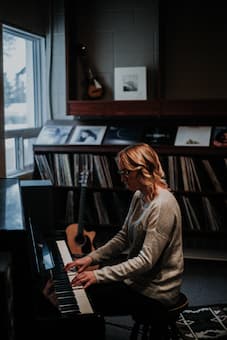 The best teachers want to be made redundant – that is, they aim to make their students confident, independent musicians. In other words, they want to encourage autonomy in their students.
The best teachers want to be made redundant – that is, they aim to make their students confident, independent musicians. In other words, they want to encourage autonomy in their students.
As a teacher, perhaps the simplest way to encourage autonomy in one’s students is to give them a choice in the music they play and learn. As a child in the early 1970s, I had my first piano lessons with an elderly and very traditional teacher who decided which pieces I would play and selected all my grade exam repertoire. I would have to practice pieces until I could play them perfectly and then I would move on to new pieces. I can still recall the excruciating boredom of some of those piano lessons and intervening practicing, when the same piece of music, which I disliked, confronted me on the music stand day after day. Looking back, I’m amazed that I stuck with the piano, but when I reached around Grade 5 standard, I began to realise that I had enough ability to strike out on my own and choose which music I really wanted to play. It was around this time that my mum bought me a score of Schubert’s Impromptus and Moments Musicaux and I sight-read these pieces voraciously. (I loved them, without really understanding much about them at the time, and that affection for these pieces remains with me today.) This was also a great learning tool, although I may not have realised it at the time: finding my own way through the intricacies of Schubert’s writing improved my sight-reading, problem-solving abilities, confidence and musicality. This was the start of my personal musical autonomy.
It seems obvious to say, but most students will be more motivated and progress better if they actually enjoy the music they are learning and playing. So don’t impose repertoire on them, in the mistaken notion that it will be “good for them”, but involve them in the selection of the repertoire by playing pieces to them. Even very young or beginner students will know what kind of music appeals to them – it may be something as simple as an attractive melody or rhythm. And if a student comes to a lesson with a piece they have selected and worked on without teacherly input, celebrate this as an important stage in their growing independence and musical autonomy.
Maurice Ravel: Miroirs – No. 3 Une barque sur l’océan (Alim Beisembayev, piano)
Actively involving students in the direction and progress of their learning, seeking their opinions on the learning process, asking them what their musical goals are or how they plan to approach their practicing, all foster confidence and autonomy. For the teacher it needn’t require a huge change of approach; simply changing some of the vocabulary one uses in one’s teaching will make the student feel far more involved in what they are. For example, instead of saying “you should practice this passage like this“, say “how do you think you might practice this passage?” or “what do you think would be helpful here?” – a simple shift from a didactic to a more collaborative approach.
Encouraging students to think about what they can do for themselves, based on their accrued technical and artistic skills, musical knowledge and experience, coupled with specific and applicable feedback and support from their teacher, helps foster a greater sense of investment in their own musical pursuits, which, hopefully, leads to increased motivation and gives them better insight, involvement and control over their own learning which leads to a deeper form of motivation than simply practicing for the next grade exam.
In addition, encouraging regular self-critique during lessons and in practicing, and equipping students with the tools to exercise that self-critique – mindful practice, self-recording, reflection and adjustments – provides them with a framework for success when similar challenges come up later and encourages them to become intrinsically motivated. With these autonomous skills in place, students have the confidence and ability to become independent, self-fulfilled learners; above all, they will enjoy their music.
For more of the best in classical music, sign up to our E-Newsletter



